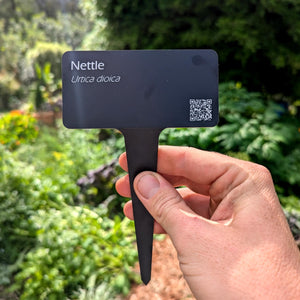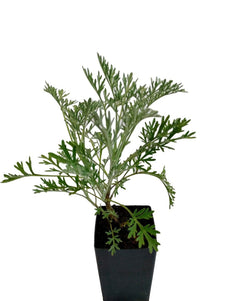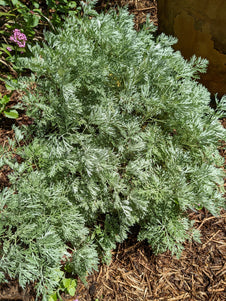





Wormwood Powis Castle
Wormwood Powis Castle

- Low stock - 4 items left
- Inventory on the way

Usually available: All year
Life cycle: Perennial
Height: 45 - 90cm
Position: Full sun
Soil preference: Well drained
This is how we pack and send your Herb Plants to all states except TAS & WA
You will receive
- 1 Wormwood Powis Castle Herb Plant in a 50 X 75mm tube - General growing instructions
All of our Herb Plants are grown organically with certified organic potting mixes and fertilizers
Botanical Name:Artemisia 'Powis Castle'
Wormwood ‘Powis Castle’ is an evergreen, woody perennial growing from 10 to 90 cm high and equally wide. There are reports of it growing quite large, however, it is likely that 45cm would be an expected height in many regions. It forms dense spreading clumps of silver grey leaves. The aromatic foliage is finely divided and feather like. The flowers are yellow, but insignificant, so they are often cut off simply to encourage the foliage display. However, the flowers are fragrant and appear from early autumn to late summer.
‘Powis Castle’ is said to be the best known Artemisia in the UK, where it is a firm favourite. The exact origins of this variety of wormwood are unknown, but it was found in a local garden and a cutting was taken by Jim Hancock in 1968. It is thought to be a cross between A. arborescens and A. absinthium. Hancock later became the Head Gardener at Powis Castle in the United Kingdom and introduced the wormwood hybrid to the gardens there. In 1972, the plant was given the name ‘Powis Castle’ by Jim Sales or Graham S Thomas, in order to help promote the National Trust Garden program.
Like many members of the Artemisia genus, ‘Powis Castle’ is grown largely for its ornamental and aromatic foliage. The silver grey foliage is ideal for contrast garden borders and is surprisingly ‘colourful’.
Growing Conditions
Wormwood ‘Powis Castle’ is a hardy plant and is evergreen in warm winter climates. It prefers soil of a dry to medium moisture level. It is an excellent plant to try in dry areas with poor to medium soil quality. The soil must be very well drained as high moisture levels will cause root rot.
If planted in full sun ‘Powis Castle’ does well, but some shade can be tolerated. If grown in too much shade the plant may become limp and lose overall quality in the leaf structure. Plant quality may also decline in areas of high humidity.
To propagate cuttings can be taken from side shoots in summer. However, it is perhaps more useful to divide a clump and replant. After a few years clumps may need to be divided to improve vigour and quality, or to remove unwanted plants. Although this plant spreads by creeping rhizomes, it is not considered invasive.
Powis Castle may be pruned to keep its shape in spring, when still growing. Leave enough buds to ensure that growth continues and that a bushy habit develops. Do not prune to the ground or prune in autumn when there is no active growth occurring. Generally this plant is considered low maintenance.
A Note on the Wormwoods
Wormwood is the common name for many plants in the Artemisia genus, which has from 200-400 named species. Each species quite likely also has many synonyms. In many cases, the name wormwood is used interchangeably with mugwort, although they are two separate species. When looking for a specific plant, be sure to check for the scientific name so you can have some certainty.
The wormwoods are hardy, woody perennials that remain evergreen during warm winters. In colder regions they generally return in spring when the seasons change. Most are very hardy, having originated in arid or semi-arid regions with poor soils and limited moisture. Some of the plants in this genus do have greenish foliage, but many have silver - grey - white foliage and these are highly prized ornamental plants. They usually have insignificant flowers and many hybrids do not produce viable seed. Most are best propagated by cuttings.
The name Artemisia is from Ancient Greek used in Hellenistic cultures, where the Goddess Artemis was the goddess of the hunt, protector of the forest and children. Artemis was also a protector of women, particularly those experiencing childbirth. The goddess Artemis was also said to be the goddess of the herbalist. The term wormwood is from the Middle English wormwode or wermode, which was attributed to the plants antihelminthic attributes in helping to expel worms from the body.
Plants such as wormwood, mugwort and sagebrush are all known for their high essential oil content. All are well known, with a long tradition in magic and folklore, where they are used for both their natural and supernatural properties. In old times, hanging Artemisia on the door was a sign that a midwife or herbalist was in residence.
All information provided on this website is for informational purposes only. Please seek professional advice before commencing any treatment.






